My one role instance needs to read data from 20-40 EventHub partitions at the same time (context: this is our internal virtual partitioning scheme - 20-40 partitions represent scale out unit).
In my prototype I use below code. By I get throughput 8 MBPS max. Since if I run the same console multiple times I get throughput (perfmon counter) multiplied accordingly then I think this is not neither VM network limit nor EventHub service side limit.
I wonder whether I create clients correctly here...
Thank you! Zaki
const string EventHubName = "...";
const string ConsumerGroupName = "...";
var connectionStringBuilder = new ServiceBusConnectionStringBuilder();
connectionStringBuilder.SharedAccessKeyName = "...";
connectionStringBuilder.SharedAccessKey = "...";
connectionStringBuilder.Endpoints.Add(new Uri("sb://....servicebus.windows.net/"));
connectionStringBuilder.TransportType = TransportType.Amqp;
var clientConnectionString = connectionStringBuilder.ToString();
var eventHubClient = EventHubClient.CreateFromConnectionString(clientConnectionString, EventHubName);
var runtimeInformation = await eventHubClient.GetRuntimeInformationAsync().ConfigureAwait(false);
var consumerGroup = eventHubClient.GetConsumerGroup(ConsumerGroupName);
var offStart = DateTime.UtcNow.AddMinutes(-10);
var offEnd = DateTime.UtcNow.AddMinutes(-8);
var workUnitManager = new WorkUnitManager(runtimeInformation.PartitionCount);
var readers = new List<PartitionReader>();
for (int i = 0; i < runtimeInformation.PartitionCount; i++)
{
var reader = new PartitionReader(
consumerGroup,
runtimeInformation.PartitionIds[i],
i,
offStart,
offEnd,
workUnitManager);
readers.Add(reader);
}
internal async Task Read()
{
try
{
Console.WriteLine("Creating a receiver for '{0}' with offset {1}", this.partitionId, this.startOffset);
EventHubReceiver receiver = await this.consumerGroup.CreateReceiverAsync(this.partitionId, this.startOffset).ConfigureAwait(false);
Console.WriteLine("Receiver for '{0}' has been created.", this.partitionId);
var stopWatch = new Stopwatch();
stopWatch.Start();
while (true)
{
var message =
(await receiver.ReceiveAsync(1, TimeSpan.FromSeconds(10)).ConfigureAwait(false)).FirstOrDefault();
if (message == null)
{
continue;
}
if (message.EnqueuedTimeUtc >= this.endOffset)
{
break;
}
this.processor.Push(this.partitionIndex, message);
}
this.Duration = TimeSpan.FromMilliseconds(stopWatch.ElapsedMilliseconds);
}
catch (Exception ex)
{
Console.WriteLine(ex);
throw;
}
}
